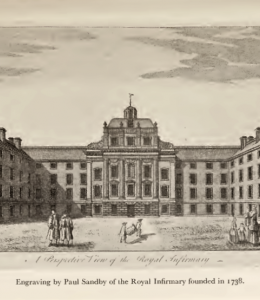
Dr Rachael Scally - orcid.org/0000-0002-1150-8868
Daiches-Manning Memorial Fellowship in 18th Century Scottish Studies, October 2021 - March 2022
Home Institution: Independent Scholar
Dr Rachael Scally completed her AHRC funded DPhil in History at Christ Church College, Oxford in 2020. Prior to that, she completed a BA in Philosophy and an MPhil in Early Modern History at Trinity College, Dublin. Her thesis examined the practice of Enlightenment in Ireland and focused on the unique and fundamental contribution made by medical practitioners to the life of Dublin’s learned societies, c.1683 – 1801. Dr Scally's research was supervised by Professor Laurence Brockliss and she is currently revising her dissertation for publication in Boydell & Brewer’s Irish Monograph Series. She received studentships from the Robert Boyle Foundation and the Royal College of Surgeons in Ireland and previously taught on the undergraduate course ‘Medicine, Empire and Improvement, 1720-1820’.
Project Title: The Early Years of the Edinburgh Royal Infirmary: Philanthropy and Slavery in Long Eighteenth-Century Scotland.
During her time at IASH, Dr Scally will begin a new project examining the financial links between the Edinburgh Royal Infirmary and slavery in the long eighteenth century. It aims to explore the hidden history and sources of wealth behind the charitable donations and bequests which made the foundation of the Infirmary and its development possible. The project will investigate how the Infirmary owned enslaved people and benefitted financially from their labour and the goods they produced. While this work will be unable to identify and reconstruct the lives of all the enslaved people who were ‘owned’ by the Infirmary over the course of more than 80 years, surviving archival material and estate records do allow us to name and gain at least a little insight into the family groups and lives of some of the enslaved, such as Berwick, Cato and Kingston Amelia, who laboured on the Infirmary’s Red Hill Pen in Jamaica. It was the suffering of these people that in part financed the treatment of the Infirmary’s patients and ensured its success as a medical teaching hospital. The project will also examine to what extent other financial gifts and support came from individuals throughout Scotland, the West Indies and elsewhere, who derived their wealth either mainly or partly from slavery and/or the trade in slave-produced goods.
The Edinburgh Royal Infirmary helped to consolidate the Edinburgh Medical School’s reputation as a centre of European medical excellence in the eighteenth century. It was steeped in the ideals of the Enlightenment and the values of improvement. Yet, how should history correctly remember it? How extensive and significant were its historical connections to slavery? What can the Infirmary’s history tell us about how Edinburgh as a city was connected to the transatlantic slave trade? Was the hospital in its early years ever really just a charitable institution or did its philanthropic mission obscure not only a legacy of exploitation but a corporation that sought to promote the interests of a powerful network of Edinburgh elites? These are just a few of the interesting questions raised by this study.
In May, she will start work on a related project funded by the Edinburgh Futures Institute titled ‘Rebuilding the Edinburgh Royal Infirmary: Philanthropy and Legacies of Slavery in Nineteenth-Century Scotland’. (PI: Professor Diana Paton/RA: Dr Rachael Scally).
